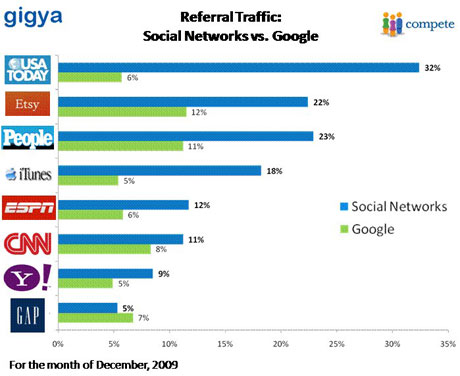OLDaily
by Stephen Downes
June 9, 2010
If Social Discovery Is Beating Traditional Search, Then What?

I think I'd want independent verification of the figures, but it`s interesting even to ponder the question of whether social network referrals are outperforming search. "If traffic is increasingly being driven by recommendation rather than metadata and clever algorithms, what are the implications for service providers?"
Brian Kelly,
UK Web Focus,
June 9, 2010 [Link] [Tags: Networks, Google, Metadata]
[Comment] [Tweet]
Is the Higher Education Bubble Going to Burst?
There has been more and more discussion of the education bubble, especially in light of online learning. Alison Leithner links to an editorial by Glenn Reynolds in the Washington Examiner and summarizes, "Reynolds claims that, similar to many properties sold during the housing market bubble, the value of university education today is simply not worth the amount of money people currently are paying. Reynolds also proposes that consumers are starting to realize this." Leithner herself is sceptical. "Èmployers will still need some way to filter out the exceptional candidates for their posted positions. They will just find a new criterion upon which to judge people. If the higher education bubble burst, it will surely be because a new bubble has started to form.
Alison Leithner,
Change.org,
June 9, 2010 [Link] [Tags: Online Learning]
[Comment] [Tweet]
Is YouTube bursting higher education's bubble? Not so fast...
John Moravec doesn't think the higher education bubble is about to burst. Writing in the context of Jeffrey R. Young's coverage of Khan Academy, a collection of hundreds of educational videos, Moravec argues that provision of content is only a part of the story. "European colleges and universities are notorious for having embraced lectures over other course formats (i.e., seminars, laboratories)," he writes. "In these environments, student learning does not occur as much within lecture halls as it occurs outside of the classroom... In the age of YouTube lectures, universities need not worry about their bubbles bursting, but rather, what they should be doing in the classrooms instead of lecturing." Which is a bit funny, because the internet is the greatest communication tool ever, facilitating more interaction more widely, in groups large and small, than any other technology, ever. Does interaction happen only at universities? Please, no.
John Moravec,
Education Futures,
June 9, 2010 [Link] [Tags: Video, YouTube, Interaction, European Union]
[Comment] [Tweet]
Harvard vs. the Internet
Kevin Carey is engaged in a war of words after calling Harvard Summer School "fake" in a Chronicle column. If the comment had been voice in Carey's regular blog, a neo-libertarian blague called "Marginal Revolution". But posting as he does in the Chronicle, he has been given the appearance of authority, which prompted a response from Donald H. Pfister, Dean of Harvard's Summer School. I think that deans from Harvard - a school that still refuses to recognize any online credit whatsoever - are ill-equipped to enter into online debate. Pfister certainly fails to realize that he was waded deep into Carey's home territory, an online flame war of dubious substance, one which sees a Harvard dean saying "we accept the credits" from the Summer school and Carey saying "no you don't." As for the accusation of "fake", by definition Harvard cannot issue a fake Harvard credential, therefore the worst that Carey could accuse them of offering is "an alternative but incompatible credential." That, though, doesn't pander.
Kevin Carey,
The Quick and the Ed,
June 9, 2010 [Link] [Tags: Schools, Web Logs]
[Comment] [Tweet]
Mobile PittState – How We Did It With No Money or Resources
Useful outline of how a mobile strategy for Pitt State was developed with a minimal budget and staff. "jQTouch is a jQuery plugin for websites that allows you to rapidly deploy mobile sites that are feature and function rich. The catch is that it really only works in WebKit browsers." That's still a large percentage of mobile web browsers.
Michael Fienen,
.eduGuru,
June 9, 2010 [Link] [Tags: none]
[Comment] [Tweet]
Informational Update on a Possible UC Systemwide Boycott of the Nature Publishing Group
An unprecedented price increase from Nature Publishing Group (NPG) has prompted a boycott by the University of California system. I link here to a copy of the memo sent to University of California staff asking them to boycott NPG and adopt open access policies instead. "Capitulating to NPG now would wipe out all of the recent cost-saving measures taken by CDL and our campus libraries to reduce expenditures for electronic journals. More information about the UC Libraries' concerns, including a history of previous unsustainable price increases from this publisher and others, is available on the CDL's Challenges to Licensing."
Laine Farley,
California Digital Library,
June 9, 2010 [Link] [Tags: Academic Journals, Information, Books, Open Access]
[Comment] [Tweet]
This newsletter is sent only at the request of subscribers. If you would like to unsubscribe,
Click here.
Know a friend who might enjoy this newsletter? Feel free to forward OLDaily to your colleagues. If you received this issue from a friend and would like a free subscription of your own,
you can join our mailing list. Click here to subscribe.
Copyright 2008 Stephen Downes
Contact: stephen@downes.ca
This work is licensed under a
Creative Commons License.